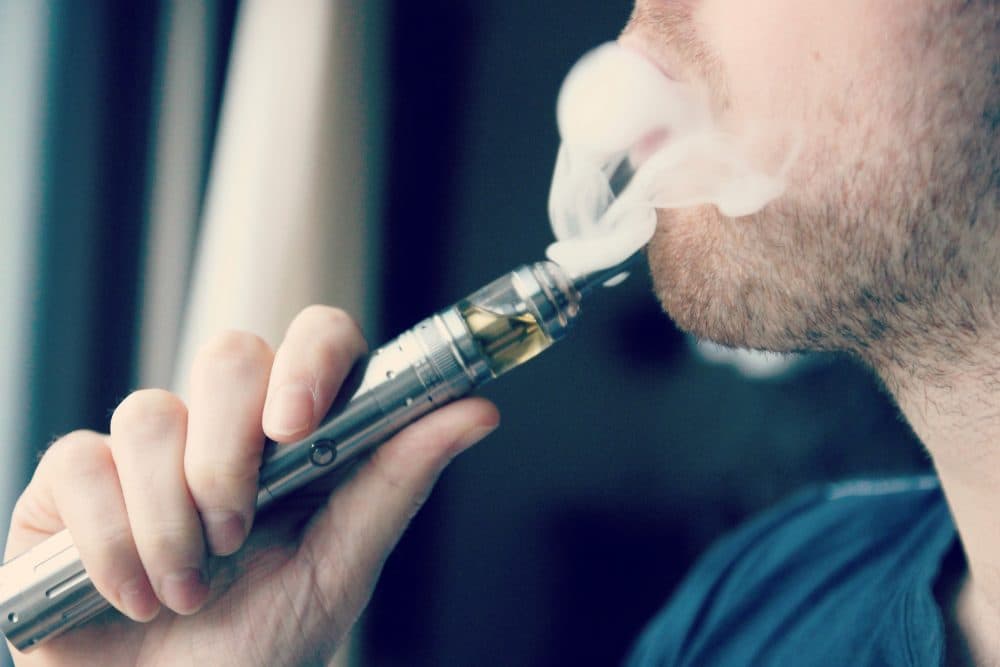Advertisement
Vaping As Lesser Evil: Boston Expert's Top Takeaways From Big E-Cig Report

Smoking electronic cigarettes is substantially safer than smoking tobacco, according to a major new national report. But while adults may vape to help with quitting, it finds, e-cigarettes also serve as the gateway through which most adolescents now come to smoking.
Most public health officials reject e-cigarettes as just another means for tobacco companies to lure customers. But professor Michael Siegel of the Boston University School of Public Health has stirred up controversy among his peers in recent years with his support for e-cigarettes as a lesser evil. He argues that vaping is a better alternative for people who are likely to smoke anyway.
WBUR spoke with Dr. Siegel about the new report, cigarettes versus e-cigarettes, and how he has been ostracized by his public health peers. An edited transcript:
Why do you think this new report is significant?
The report really lays to rest several major misconceptions that have been kind of lurking around for quite some time.
• First of all, I think it's very clear that vaping is much safer than smoking.
• Second, if people switch from smoking to vaping that is a good thing, it can improve their health.
• And third, for at least some people, vaping is a very effective method to help them quit smoking.
What about the long-term effects of using e-cigarettes? Do we know how they compare to cigarettes?
There is a debate over the long-term health effects. There are some observable short-term physiological changes with these cigarettes, but we have no idea what the long-term consequences are, if any.
And the report concludes that there is no evidence right now that vaping causes long-term health consequences, like heart disease, respiratory disease or cancer. So that doesn't mean that it's safe, it just means that we haven't identified any long-term risks.
Is that simply because e-cigarettes haven’t been around long enough for researchers to study whether they lead to long-term health problems?
Yes. Even for smokers, we know that it's very rare to see a smoker coming into the hospital with [lung disease] or cancer or heart disease in their 20s or 30s or even 40s. It takes maybe two to three decades of smoking before you actually develop chronic disease. So certainly for vaping, which is much safer than smoking, you're not going to expect to see consequences in even 10 or 15 years.
I think the most important takeaway from the report is that if there are any long-term consequences [to vaping], they're certainly going to be a lot less serious than smoking.
But there are ingredients that are vaporized in e-cigarettes that haven’t been tested for safety, right?
They all contain propylene glycol and glycerin and usually nicotine and a little bit of water, and then some flavorings. And that's basically it. We know those flavorings, propylene glycol and glycerin are considered safe to consume, but we don't know the effects of inhalation, especially, long-term inhalation.
Can vaping be addictive?
There is evidence that vaping can be an addictive behavior but the addiction potential is is not as strong as it is for cigarettes.
The nicotine delivery from electronic cigarettes is just nothing close to what you get from a cigarette particularly in terms of the spike in the nicotine level. When you smoke a cigarette, your nicotine levels rise rapidly and reach a very high level, and then they actually drop off rapidly. But with most e-cigarettes, the level goes up slowly and goes down slowly -- so it's not giving you a hit and then that withdrawal feeling.
We don’t have the same worry about second- or third-hand effects from e-cigarettes, as from tobacco cigarettes, right? People in the same room with someone vaping don’t get the same health problems and rooms don’t stink of smoke for hours?
Right. Secondhand exposure to someone else's vaping is a lot safer than being exposed to someone who's smoking. Tobacco smoke tends to really hang around in the atmosphere for a long time, it doesn't dissipate; whereas the aerosol that the vaper's exhaling tends to dissipate very, very quickly -- literally within seconds it disappears.
I would add that this also makes it difficult for parents to detect when their kids are vaping because, if your kid is smoking, you can most likely smell it on them. So it makes it more of an insidious behavior that's harder to detect.
The report concluded that kids are using e-cigarettes as a gateway to smoking conventional cigarettes. Does that concern you?
What the report found is that youth who experiment with e-cigarettes are more likely to subsequently experiment with real cigarettes and then potentially to end up smoking. That doesn't necessarily mean that it's the e-cigarette that is causing them to smoke. It simply means that when kids are experimenters they're more likely to experiment with other things.
So, the kids who are vaping would otherwise be smoking?
Vaping culture is replacing smoking culture. Even though the rate of vaping among youth has literally skyrocketed over the last four years, the rate of smoking has plummeted to an all-time historic low, and the rate of decline in youth smoking has been steady if not increased during this time.
With alcohol, the earlier kids start drinking, the more likely they are to become problem drinkers. Is that the case with e-cigarettes?
That principle is generally true with all drugs – that the younger you are, the more susceptible the brain is to changes. And also just psychologically and socially, kids who are prone to substance abuse at an early age are more prone to becoming serious users or addicted users. So that definitely is a concern.
There are seemingly dozens of brands of vaporizers. Are any safer or riskier than others?
The Juul [brand] actually does simulate the delivery of nicotine to the blood that tobacco cigarettes produce. So you get a rapid rise in nicotine in the blood and then it goes down relatively quickly. So I think Juul does have a potential to be more addictive than the typical cigarettes. And parents should be particularly attentive to whether their kids are vaping versus Juuling.
Does the U.S. Food and Drug Administration, which has only been regulating the e-cigarette industry since 2016, have much oversight?
The FDA is not setting safety standards. There are companies that have batteries that are literally exploding. It's inexcusable. I think that there's a lot that the FDA could be doing to regulate to make it safer. And they're just not doing that.
Is there a way for parents or consumers to figure out which brands are safe and which might not be?
I'm not aware of any website where you can see "here's a list of [products] that have been a problem." Ironically, the products that are made by the big tobacco companies are probably the safest on the market. These companies have good manufacturing standards. So, if I had to choose a brand I would go with the tobacco company brand.
Have you gotten a lot of grief from your colleagues because of your open-mindedness to e-cigarettes?
Some organizations have refused to appear on the same stage with me. I've been part of the tobacco control movement for 25 years, and I’ve been part of the mainstream for 22 of those years. The last three years, I’ve veered off. I see a value in harm-reduction which I think a lot of my colleagues don’t.
Why did you come to a different conclusion than so many of your peers?
When I first heard about these products, I thought it was just another tobacco ploy. It wasn’t until I started talking to people who were vaping that I realized that these products were literally saving their lives [by helping them quit smoking]. These were people who were highly addicted. They were almost certainly going to get disease if they continued to smoke. I see a huge potential upside to these products -- but that doesn’t mean we shouldn’t do things to make them safer.
Top photo via Vaping 360/Flickr.
